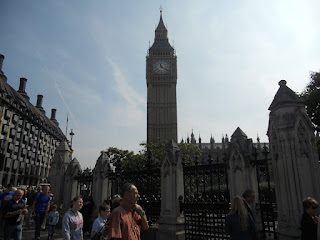“When a man is tired of London, he is tired of life; for there is in London all that life can afford.”
So said Dr. Johnson, and I am reminded of him whenever I wonder what it is that brings me back to the city. When I mentioned that I would be spending last Sunday there, someone said, “You know we’ll be back there before the end of the semester.” I do know that, but London is a book to be read more than once—even more than twice. Every time I go there, I see or understand something new.
The first draw for me, I think, is the theatre, which was the reason for my most recent trip. My friend Allie and I went to see Marlowe’s Doctor Faustus at the Globe. To anyone who has not seen a play at the Globe yet, I highly recommend it. (Their season ends October 2, though.) Not only is it five pounds for a standing ticket in the “yard,” but these tickets are some of the best in the house. We arrived in London around 10:30 am and went directly to the theatre, where we joined a short queue of people waiting for the house to open at 12:30. You don’t have to get there as early as we did—forty-five minutes to half an hour is more than enough—but it was exciting to be some of the first ones there, squashed between some theatre students and a guy reading The Death of Ivan Ilyich.
Because we were some of the first in the house, we got to stand right up against the center of the stage, where much of the action happened. If I needed further convincing that we had the best spots in the house, it came in the form of the official photographer, who stood next to me after intermission.

Doctor Faustus is an odd play because it is technically a tragedy—Faustus, a learned man bored with the mortal world, sells his soul to the devil—but it is full of spectacle and lowbrow comedy. This production balanced the two levels perfectly, and it was both entertaining and scary. The two leads had perfect chemistry: Paul Hilton as Faustus, power-hungry and full of dramatic gestures, and Arthur Darvill as Mephistopheles, from whom all the power really comes. Where Faustus swings dramatically between fascination with his incredible power and fear for his soul, Mephistopheles is docile, completely compliant with Faustus’s will and only occasionally revealing the pain he knows Faustus will suffer, which he, Mephistopheles, suffers eternally. He is always in the back of the scene when Faustus impresses people with acts of magic, and Faustus’s grand gestures are always accompanied by a small motion of Mephistopheles’ hand. The staging prompts the audience to ask who really motivates the action, a question emphasized by some clever costuming, which makes the two characters look more and more alike as the play progresses.
But in addition to being intellectually challenging, the production is just plain fun. Understanding, I think, that Marlowe intended Faustus to be much less a morality play than an entertainment, this interpretation is completely faithful to Marlowe’s wacky comedy. It includes, among other things, a song and dance number, a beheaded man coming back to life, and some harassment of the Pope involving grapes. Oh, and did I mention there were dragons?
We left the theatre thoroughly satisfied.
While I’m not sure London has “all that life can afford,” as Dr. Johnson said, it is certainly impossible to be bored there. We managed to occupy several hours before our train mostly by walking around. We crossed the Millennium Bridge from the Globe, which is almost on top of it, back to the north bank of the Thames. On this side of the bridge, rising above everything else, is the dome of St. Paul’s. It’s impossible to miss, but somehow I’d never properly noticed it before. Oh, my god, I thought. It’s freaking St. Paul’s. This epiphany, albeit in more eloquent terms, must be exactly what the builders of the bridge intended for us.

When we eventually attempted to return to King’s Cross, we ran into the first hiccup of the day. By this point we were in Trafalgar Square, having sat there to study for our British Studies Quiz. (Studying on top of a national monument? Check it off the bucket list.) We walked to the Charing Cross Tube station, but the entire Northern Line was down! With little time to spare, we blundered our way back to Leicester Square, and by the time we made it to King’s Cross we were running up and down the escalators. One of us said to the other, out of breath, that we probably had a fifty-fifty chance of making it. We checked the departure board, put our tickets through the slot, and took off running—skipping? we definitely held hands at some point—toward our platform. We just made it. We took our seats, winded but proud.
Check it off the bucket list? Absolutely. I’ve learned my lesson—check the Tube closures before coming—but there was no harm done. I still love coming to London, and I hope I never tire of it.

















